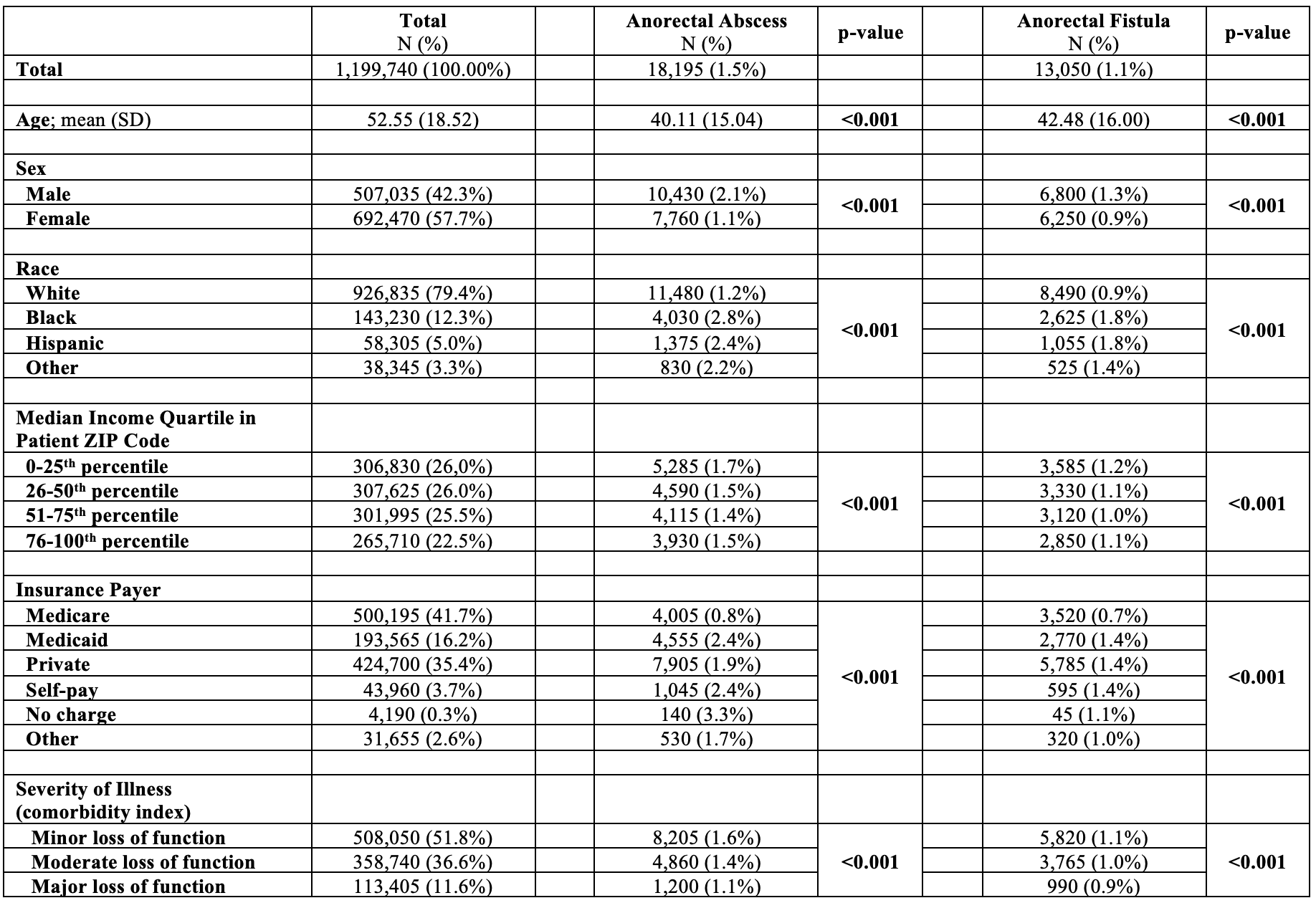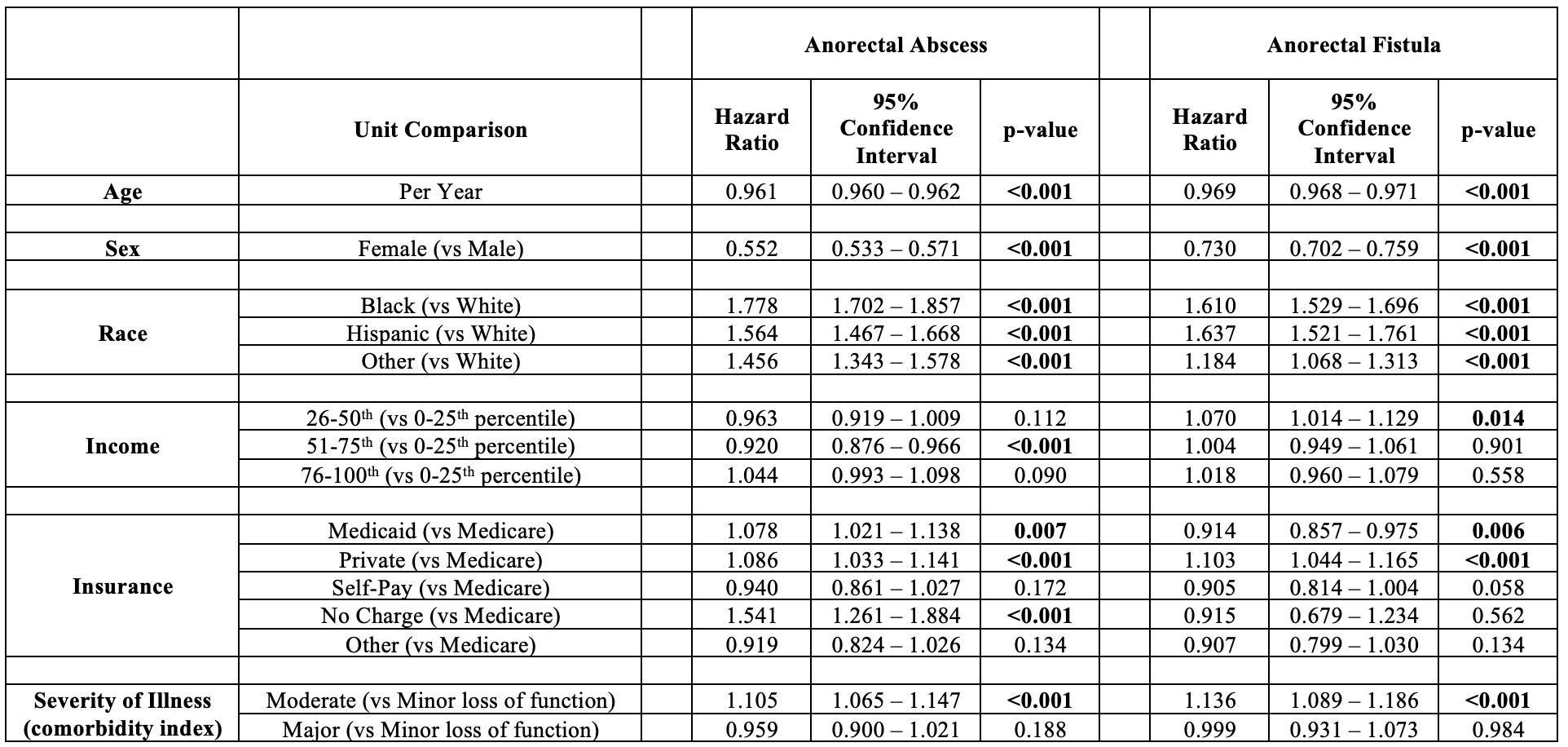Tuesday Poster Session
Category: IBD
P5301 - Predictors of Anorectal Complications in Crohn’s Disease: A National Analysis
Tuesday, October 28, 2025
10:30 AM - 4:00 PM PDT
Location: Exhibit Hall

Vraj P. Shah, MD
Rutgers New Jersey Medical School
Newark, NJ
Presenting Author(s)
Vraj P. Shah, MD, Ahmed Al-Khazraji, MD
Rutgers New Jersey Medical School, Newark, NJ
Introduction: Anorectal complications, including abscesses and fistulas, are relatively common in patients with Crohn’s Disease (CD); however, they are associated with significant morbidity and mortality. Recent literature has highlighted demographic disparities in the management and outcomes of patients with CD. Our study aims to contribute to the literature by providing a national cohort analysis of demographic predictors of anorectal complications in patients admitted with CD.
Methods: We performed a retrospective population-based cohort study using the 2016-2020 National Inpatient Sample (NIS). The NIS was queried for adult inpatients with a diagnosis of CD. Bivariate analyses were performed to compare the demographics of patients with and without anorectal abscesses and fistulas. A multivariable logistic regression was then performed to identify predictors of anorectal complications.
Results: A total of 1,199,740 patients with CD met inclusion criteria, with 18.195 (1.5%) having anorectal abscesses and 13,050 (1.1%) having anorectal fistulas. On bivariate analysis, male patients had a greater incidence than female patients for abscesses (2.1% vs 1.1%, p< 0.001) and fistulas (1.3% vs 0.9%, p< 0.001). There were significant differences in race, income, and insurance in those experiencing abscesses and fistulas (p< 0.001). On multivariable analysis controlling for demographic factors, female patients were at decreased risk for developing abscesses (OR=0.552, p< 0.001) and fistulas (OR=0.730, p< 0.001). Black patients were at increased risk compared to White patients for developing abscesses (OR=1.778, p< 0.001) and fistulas (OR=1.610, p< 0.001). Hispanic patients had an increased risk compared to White patients for developing abscesses (OR=1.564, p< 0.001) and fistulas (OR=1.637, p< 0.001).
Discussion: In a large national inpatient cohort of patients with CD, significant demographic disparities are present in association with the development of anorectal complications. Our study highlights that female and White patients are less likely to develop anorectal abscesses or fistulas when compared to male and non-White patients, respectively. These findings further contribute to existing literature demonstrating demographic disparities in the management and outcomes of patients with CD. Given that anorectal complications portend poorer outcomes in CD, further research is indicated to explore the underlying cause of these disparities and to develop targeted interventions to address these differences.

Figure: Table 1: Bivariate Analyses of Crohn’s Disease Patients with and without Anorectal Abscess and Anorectal Fistula

Figure: Table 2: Predictors of Anorectal Abscess and Anorectal Fistula in Patients with Crohn’s Disease (multivariable logistic regression)
Disclosures:
Vraj Shah indicated no relevant financial relationships.
Ahmed Al-Khazraji indicated no relevant financial relationships.
Vraj P. Shah, MD, Ahmed Al-Khazraji, MD. P5301 - Predictors of Anorectal Complications in Crohn’s Disease: A National Analysis, ACG 2025 Annual Scientific Meeting Abstracts. Phoenix, AZ: American College of Gastroenterology.
Rutgers New Jersey Medical School, Newark, NJ
Introduction: Anorectal complications, including abscesses and fistulas, are relatively common in patients with Crohn’s Disease (CD); however, they are associated with significant morbidity and mortality. Recent literature has highlighted demographic disparities in the management and outcomes of patients with CD. Our study aims to contribute to the literature by providing a national cohort analysis of demographic predictors of anorectal complications in patients admitted with CD.
Methods: We performed a retrospective population-based cohort study using the 2016-2020 National Inpatient Sample (NIS). The NIS was queried for adult inpatients with a diagnosis of CD. Bivariate analyses were performed to compare the demographics of patients with and without anorectal abscesses and fistulas. A multivariable logistic regression was then performed to identify predictors of anorectal complications.
Results: A total of 1,199,740 patients with CD met inclusion criteria, with 18.195 (1.5%) having anorectal abscesses and 13,050 (1.1%) having anorectal fistulas. On bivariate analysis, male patients had a greater incidence than female patients for abscesses (2.1% vs 1.1%, p< 0.001) and fistulas (1.3% vs 0.9%, p< 0.001). There were significant differences in race, income, and insurance in those experiencing abscesses and fistulas (p< 0.001). On multivariable analysis controlling for demographic factors, female patients were at decreased risk for developing abscesses (OR=0.552, p< 0.001) and fistulas (OR=0.730, p< 0.001). Black patients were at increased risk compared to White patients for developing abscesses (OR=1.778, p< 0.001) and fistulas (OR=1.610, p< 0.001). Hispanic patients had an increased risk compared to White patients for developing abscesses (OR=1.564, p< 0.001) and fistulas (OR=1.637, p< 0.001).
Discussion: In a large national inpatient cohort of patients with CD, significant demographic disparities are present in association with the development of anorectal complications. Our study highlights that female and White patients are less likely to develop anorectal abscesses or fistulas when compared to male and non-White patients, respectively. These findings further contribute to existing literature demonstrating demographic disparities in the management and outcomes of patients with CD. Given that anorectal complications portend poorer outcomes in CD, further research is indicated to explore the underlying cause of these disparities and to develop targeted interventions to address these differences.

Figure: Table 1: Bivariate Analyses of Crohn’s Disease Patients with and without Anorectal Abscess and Anorectal Fistula

Figure: Table 2: Predictors of Anorectal Abscess and Anorectal Fistula in Patients with Crohn’s Disease (multivariable logistic regression)
Disclosures:
Vraj Shah indicated no relevant financial relationships.
Ahmed Al-Khazraji indicated no relevant financial relationships.
Vraj P. Shah, MD, Ahmed Al-Khazraji, MD. P5301 - Predictors of Anorectal Complications in Crohn’s Disease: A National Analysis, ACG 2025 Annual Scientific Meeting Abstracts. Phoenix, AZ: American College of Gastroenterology.
